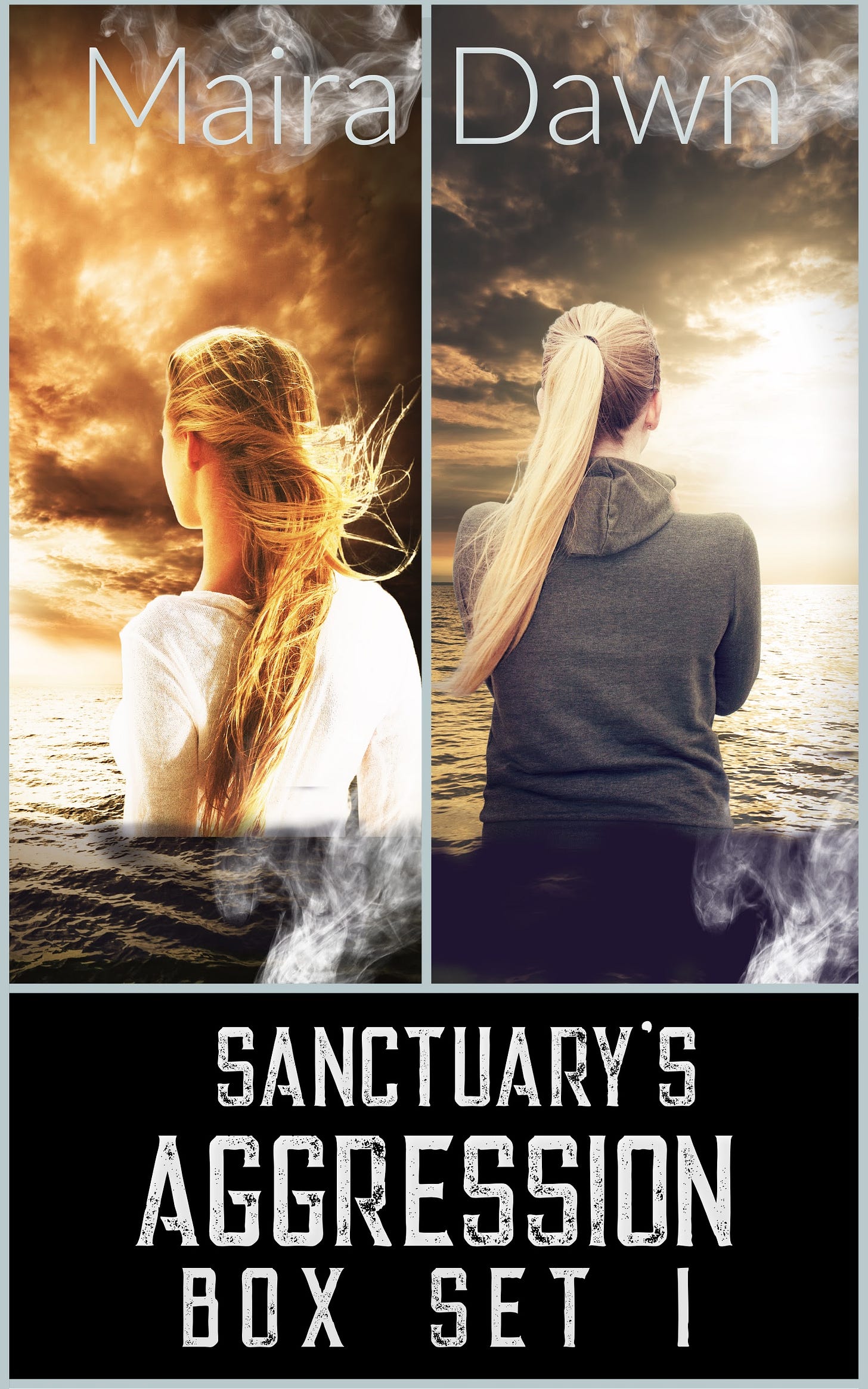My first stories were written and published on Wattpad. It was my practice arena, so to speak.
I still have a few chapters from some of the Sanctuary’s Aggression book uploaded. They sit there reminding me of my beginning.
Another reminder is also there. A sci-fi short story that I dreamed up one day and uploaded to the website. It remains there in it’s very raw state. Someday I’ll fix it up.
And that brings me to my first mistake as a new writer.
I totally underestimated how much time it takes to edit one page, let alone a book.
Oh, my word! If I had known about this well-kept secret, I’m not sure I would’ve kept up with the word race. While fiction movies and books often show their characters struggling for exactly the right word, it is usually just a bump in the road—not the whole road.
Yes, I thought I would whip out a story and any editing would be quick and easy. Maybe it is for some. For me, every hour of writing is at least an hour, two—or more— in rewrites, spellchecking, grammar checking, etc.
And that is just my part of the editing. My editor always finds things for me to do.
While editing is important, I didn’t think I had money for it.
Uh, oh, The E word. Okay. Please remember that I started on Wattpad—where people were reading my stories with glaring errors and never complaining. Or they gave me a (kind!) helping hand and pointed them out.
It wasn’t like I left the book raw. Before I published, I did multiple passes with every editing software I could get my hands on. I also traded manuscripts with other new writers, and we edited each other’s work. Another time, I traded work with an actual editor.
However, I’m happy, and relieved, to say I now have a great editor for my books!
But I totally understand when people say the cost of an editor is stopping them from publishing. And I have read some great books from people who use alternative means to get their books ready for publishing.
I’ve had a handful of bad reviews over typos on those first books, but more often people remarked that they believed them to be well-written books.
It often takes getting the book out there to get money to hire an editor.
I didn’t understand my audience.
My first book was a story that resided in my head for a while. I wrote it as I saw it. I wasn’t thinking about anyone but myself and getting the words onto the page. I didn’t consider myself a writer and only dreamed that I would ever publish it.
If I would’ve taken a few hours to look up what kind of audience would like the books I write, I could have tweaked it a little to reach an even larger audience. Since my goal was not only for people to enjoy what I wrote and maybe to eventually sell that book, it would’ve been well worth my time to see what my audience would like to see in the book.
I read so much stuff about writing that I got very confused.
The last story I’d written (before getting on Wattpad) had been years ago. And since I’d never taken a single class on writing beside high school, I needed to learn how to write—exactly how to put a story together. Right?
I turned to the Internet. Imagine me, mouth gaping, pulling out my hair on seeing the endless pages of advice on how to write fiction! Ugh.
I started reading everything before realizing I needed to focus. Much of the advice contradicts each other, and everyone feels their opinion is the right one. It was so difficult.
I finally found the best advice I would receive. There are no rules in writing.
What? How can this be?
It’s true. Guidelines, yes. Actual hard rules, no.
Consider this: For every time I’ve heard not to info dump, or show—don’t tell, or not to start the book with a person waking up, there are people out there blatantly flaunting those rules and successfully getting away with it.
So here is what I did. When I heard a lot of the same advice, I took the time to consider it. And then I decided if I would follow it.
I also found a few different courses on writing, took them, and now I use what works for me.
I thought I would write one story and be done.
Oh, all the other writers must be laughing at me. No, one story did not do. Once the floodgates were opened, the ideas couldn’t be stopped.
The fact is I come up with so many ideas, no one could ever write stories to them all. That is probably a good thing. They can’t all be good ideas.
I write—or edit—almost every day. And I think, that is the way it will be for a good long while.
Happy Reading,
Maira :)
Below are some great book deals, including a couple of my own.
I am also uploading the new story I’m writing, What Used to be Texas, to Kindle Vella every week as I get chapters done. The first three chapters are free, if you’d like to check it out. Amazon gives away 200 tokens when you sign up.
Winter Prepping for your Car
It’s that time of the year for a lot of us. The gentle autumn wind will soon turn into a cold so sharp, it’ll cut through even the warmest layers we have on. And that can be dangerous.
My husband drives an hour to and from work—through a snow belt. So, we do a little prepping. Especially these last few years when it seems more and more common for the highways to jam up and cars—with passengers—are stranded for hours, sometimes even days.
I wanted to share this list with all of you. Maybe it will be helpful. This information is taken from the Ohio.gov website and it the emergency preparedness Kit for Vehicles.
Some of these ideas are good for all year and some especially for winter.
By the way, kitty litter has saved us more than once when stuck in snow and ice.
It’s a long list and while every item is important. I always start somewhere—usually with the winter stuff—and work out from there. We already had many of the items and just needed to gather them together.
In addition to winterizing your car, it is recommended the following items be kept in a large plastic tub with a secure lid.
Two blankets or a sleeping bag
Flashlight with spare batteries, water and shock-proof, if possible
Extra clothing—particularly hats, boots, and mittens or gloves
Bottled water and nonperishable high-energy food such as granola bars, raisins, nuts, hard candy, peanut butter, cheese crackers, etc.
Emergency flares
Jumper cables
Spare tire/tire iron/jack
First-aid kit and necessary bandages/medications
Sand or non-clumping cat litter for tire traction if vehicle gets stuck on ice or in snow
Cell phone with extra cell phone battery or charger
Tow rope or chain
Brightly colored clothes to use as signal
Keep the exhaust pip clear of snow. Poisonous gases filter into your vehicle if the pipe is clogged.
The Farmer’s Almanac added a few more things for their winter car emergency kit. They are:
Ice scraper and snow brush
Multi-tool, such a a Leatherman or Swiss Army knife
Windshield cleaner
Collapsible or folding snow shovel
Tire chains or tow strap
Hand warmers
Other essentials they recommend:
Small fire extinguisher
Tire gauge
Rags and hand cleaner
Duct tape
Foam Tire sealant for minor punctures
Rain poncho
Lighter and box of matches in waterproof container
Scissors and string or cord
Spare change and cash"
Compass
Paper maps
Do you think this is a good list? Or are there other things you would add?
Book Deals
All Subgenres of Science Fiction—All in Kindle Unlimited!
November Sci-fi in Kindle Unlimited!
50 Post-apocalyptic, Dystopian, and Steampunk ebooks for sale. Starting at 99c!
Science fiction and Fantasy Giveaway! 169 ebooks are all yours.
There is also a drawing!
Maira Dawn Books
Dip a toe in. The first two books—Sanctuary’s Aggression: The Beginning and The Atlantis Cure on sale for 99c.
Or dive right in! The complete book set is now on sale for only $7.99.










